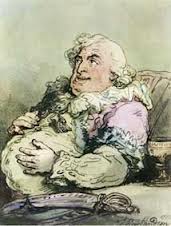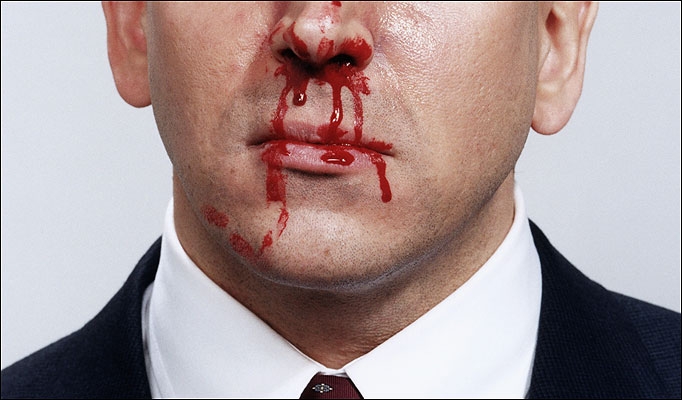We’ve already established that Man’s thirst for kings is nearly innate based on history’s only two examples, the Hebrews under the Judges and the United States under the Constitution, where both began as free peoples with no excess baggage of kings to throw overboard.
Now we come to the easy part, and that is to determine, not if there are men who have an equal thirst to rule, but how they rose in a democratic setting. Saul wanted to be king, but George Washington didn’t. Why does Barack Obama want to follow Saul?
A Peerage of the Mind
I wrote earlier that America never had a nobility. But we did have a gentry class, mostly in the plantation South, and a few were even knighted. This is not to say they could get the same amenities as their lordship counterparts in England, such as having reserved seats at the Royal Theatre, since there wasn’t one, or their own tony private Men’s Club, or even being able to pull rank and roust a common yeoman from the best table at the local tavern, of which there was usually only one.
Theirs was, by and large, a peerage of the mind.
Still they understood class, and like modern lawyers, who also carry the title, Esq, they set themselves apart as elites. It was on this account Thomas Jefferson was considered a traitor to his class, for his Declaration of Independence and subsequent Constitution was indirectly about class, especially hereditary class and privilege. In so many words, the US Constitution abolished it in favor of attained class; merit.
Jefferson wasn’t the only gentry, keep in mind, for most signatory southern representatives to Independence Hall in 1776 were similarly situated as Jefferson. But Jefferson was from Virginia, the queen of the colonies, and moreover, wrote words that still harken men of all degrees into battle against tyranny. Pity the poor Egyptian who carried Jefferson’s words into Tahrir Square two years ago while its organizers were carrying the Caliphate Organizer’s Handbook. (Seems our “good men” haven’t risen to protect any American trademark of late.)
So while we created a Senate, we did not want a House of Lords. The Founders wanted a senior house that would be more deliberative than the more open and chaotic people’s house, but they did not want a senior house that could simply veto everything the commoners suggested. Two houses, with at least two competing political parties, and certain laws arising only in the commoners’ chamber, such as taxation. This made them co-equal.
You see, the Founders knew only too well the peerage of the mind that existed in the unicameral Roman Senate, which gave rise to a Roman Caesar, thus killing off the Republic for what turned out to be an eternity.
Every new king enters either on the black horse of conquest or on the white horse of reform. But to some extent they almost all promise to quell corruption and excessive power, just to quieten the people. But no matter how serious their intentions, within two generations, the king’s children and grandchildren…complicated by concubines and little half-princelings crawling around, and the “royal line” to protect, plus all the new rice bowls they created inside the palace grounds…that legacy of reform quickly falls into a competition for succession and a consolidation of power.
The first quality of good kings to depart, then, is almost always merit, for while the first king may have been full of it, his sons were more like the kid with the rich dad who put together his own garage band instead of taking over the family business. Most dynasties can survive 3-4 generations on inertia alone, while all the cultural assets are dissipated away. This is why dynasties are destined to fall; hereditary succession. Still, it is the one thing men of power always seek to perpetuate.
America has always gone against this natural impulse of powerful men to bite off more than they can rule, but in 2012 this power to say “no” was ended.
OK, kings are a thing of the past. But dictatorships (for life) aren’t. Nor is a perpetuation of the power and wealth of a noble line. Just below the king was always a bevy of royal peerages going by various names; duke, barons, lords, etc. Appointing these started out as a management technique, to keep possible contestants to the throne in line. Give them a patch of land and a castle, when land was the biggest source of wealth in the world (then deny Jews the right to own land, sort of like an all-white basketball league), then have them pay part of their profits back to the king as tribute (also called taxes, since it’s about the same. Obama even acknowledged as much when he said “You didn’t build that.”).
Thanks to the French this type of king-based aristocracy was turned into a club of nobility with all sorts of exclusive rules for admittance, since all the lands of the West were owned by this one club of kings and in those days France was Top Country. Kings might come and go, dynasties might come and go, but they would always be replaced by one of their own kind.
Note how long this system has persisted, for it contains elements that all the socialists want to be able to replicate, an order that will last a thousand years instead of the pitiful 40-60 year regimes they are able to pull off today.
The Dark Ages lasted roughly 1000 years (400-1400), but are not called Dark because of the presence of kings. The Dark Ages were so titled because the kings were barbaric oafs. They ate meat with a hunting knife in large stone halls that looked more like an Arnold Schwarzenegger movie set than a dining room. And not a one of them could read a lick. Or even sign their name (hence the royal seal). Brilliant and cunning in warfare (at least for awhile, until the French added skulduggery, back-stabbing, sniveling, foppery, lace hankies, etc…I can go on…to being king) administration and business, they hired scriveners to write their letters and factors to do their contracts and manage their business affairs.
This process began in the 10th or 11th Century and while no one paid any notice to it at the time, the first seeds of the kings’ demise began when they started hiring men who believed they were smarter than the king (but had never picked up any weapon heavier than a turkey quill.).
Because of reading and writing, in part, but also because of the Church, and the rise of the town and commerce, by 1400 the West entered the Renaissance, and despite keeping the Jews out of the loop, great wealth was created in the private sector anyway. A lot of this wealth was centralized in the markets that purveyed to the royals, but trickle-down was proved, for even more wealth was created in manufacture, food services, and generally buying and selling, purveying to the needs of a merchant class who no longer serviced only the royals. Many had become so rich the French had to create an entirely new “estate” for them, the bourgeoisie, or middle class.
As we know now, the middle class never quite fit into the aristocratic scheme of things, especially when it was allowed to become wealthier than the nobility, as they certainly always did. (Suggested reading: Barbara Tuchman, A Distant Mirror about 14th Century France.)
From this new class a second source of wealth arose (cash), one that was not directly associated with the ownership of land which supported the nobility. (Land is still the principal source of wealth and income for the British Royal House. Maybe Obama should tell them they didn’t build that either. I wonder if British socialists would agree?)
Over time the power of kings diminished. By the 19th Century most European countries were governed by legislatures with only the advice and consent of kings, the Hohenzollerns (Germany), Hapsburgs (Austria-Hungary) and Romanovs the only exceptions, until they were buried in the ashes of WWI.
But what hung on throughout the period even unto today was the general perqs and powers of peerage. Aristocracy. The last duke standing still got to bequeath his land and his title to his sons and daughter.
Consequently the English House of Lords were not exactly toadies for the Crown, for they had their own prerogatives and perquisites to protect. They were an elite class, almost always above the law in petty civil matters such as property matters, divorce, petty theft, drunk driving, and even unlawful death. In other words, they were treated the same as an Italian count with a new Maserati, or a Baltimore Ravens line-backer.
American attitudes about Peerage
The Founders were clearly against this entire notion of peerage, assuming correctly that in the free market system that comes with the Constitutional package, wealthy men and wealthy Houses would rise and fall in the normal ebb and flow of commerce. Under their system a permanent aristocratic House would not be able to rise and sustain itself hereditarily.
But the Founders were also against peerage because an hereditary aristocracy carried with it certain attitudes about culture and morality which were, in the long run, antithetical to the constitutional blueprint, including national loyalty. Aristocrats were generally amoral about moral issues. Like the Sioux and Democrats there was one code of behavior that applied to behavior within the club (tribe) and another that applied to conduct and behavior with the other 95%. The name almost every American Indian tribe gave itself was “We, the People,” while everyone else was “them” or fair game. Like Christ, the Constitution was designed to extend love and loyalty beyond family, and into a world built on reciprocity and pursuit of mutual interest. Teamwork.
Rather than bore you, watch the 1932 film, Grand Hotel, with both the Barrymores, Garbo, and Joan Crawford. It’s all about social attitudes of aristocrats in 1930 Berlin. Another interesting film is Ninotchka, a 1939 Garbo comedy-romance, about an aristocrat who falls in love with a Soviet apparatchik in Paris. In the dialogue you get a sense, and Hollywood’s understanding, of things like love, sentimentality, illicit romantic liaisons, class distinctions. Aristocrats were generally against it. Still are.
Chesterton said this about the poor and the rich:
The poor man has a stake in the country. The rich man hasn’t, he can go away to New Guinea on a yacht. The poor sometimes object to being governed poorly, but the rich object to being governed at all.
In another context, GK said virtually the same thing about morality. Only the poor need it. It’s a survival mechanism.
So here we are in 2012, and while I think Frank Capra always knew this fight was about class, and even Sinclair Lewis, an avowed socialist, yet who portrayed the foibles of the idle rich as well as any, the attempt to create a new hereditary class in America is now before us.
The New Peerage Alliance
1. The Asset Wealthy vs the Working Wealthy
The recent tax deal our “good men” in the GOP signed onto, increasing taxes on those who work for their wealth to 36% while the asset-wealthy, those who live off dividends and interest, and whose wealth, like the lands of medieval Europe, is fairly stationary (in stocks, which government can protect, not land), proved there is a new House of Lords in the works.
This is not new. If you’re a fan of Jane Austin, whose novels were about England in the early 1800s, it was every girl’s (or her mother’s) dream to be able to marry up, especially to a gentleman, who was defined by the rules of the day as one who had not had to work for a living for at least three generations. Being a worthless layabout was bad, a wealthy layabout, good.
In the story of Beatrix Potter, the creator of Peter Rabbit, she fell in love with her publisher and wanted to marry him. Her mother absolutely forbade it because he was “in the trades” and she and her family were not. A wealthy man, her mother still considered Warne (one of the founders of the Frederick Warne publishing house) beneath them as he worked for his money. He was too “ambitious,” trying to marry up, her mother decried, “ambitious” as vile and dirty a word as “lying Democrat” is today. (Pinch Sulzberger, call your office.)
In other words, words we have always used to describe merit in a man or woman in America; ambition, hard work, were considered dirty words by the gentler classes of Victorian England even into the 20th Century. In certain circles they still are.
2. The Ruling Class Lords
Obama has done well to resurrect that sort of class consciousness, and it’s clear he’s creating an alliance between the Asset Wealthy and the political Ruling Class, since with no king around anymore, only the government can guarantee the Asset Wealthy the hereditary permanence for their House they need.
This will be short lived, as Hitler proved, for in the end there is only the political ruling class to replicate a new thousand year Order (since “Reich” and “Dark Age” have already been taken).
This is because this impulse to rule over things other men built is as innate an instinct among faux men as copulation is among real men.
Remember all those scriveners and factors from the 13th Century on? Well, in the 17th and 18th centuries they went to university and became historians.
I won’t repeat in detail what I’ve said many times before, but Karl Marx’s biggest hatred with capitalism wasn’t that it oppressed the poor, but that it was his class who should be in charge. He was driven by a peerage of the mind built on jealousy and envy, not merit, not even inherited merit. Marxism is to society what ivory hunters are to elephants.
In Europe, that peerage of the mind has become manifest in the European Union. After World War II the Euro-bureaucrats made a deal with the surviving aristocratic houses that would protect most of their perqs (and immunities) in exchange for the bureaucrats taking all of their powers, but with the promise to keep the people from knocking down their doors and dragging them out as they did in Paris in 1787. (The French Revolution is still, in aristocrats’ mind, how the people would behave today if they could only have an unimpeded shot at them; the same way the GOP sees conservatives, as a new Barry Goldwater just waiting to happen.)
So what we are dealing with in America is peerage of the mind that has been around for two centuries at least, but one which is now about to be made real.
(As I said in my last post, it will be interesting to see if they hang as well as their royal predecessors.)



